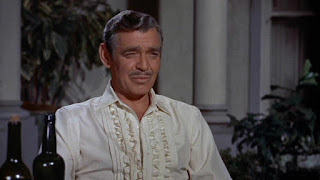 |
| Suzanne Pleshette and Troy Donahue |
A DISTANT TRUMPET (1964). Director: Raoul Walsh.
"Burning while Rome fiddles?"
Lt. Matt Hazard (Troy Donahue) is sent from the graduating class at West Point to Fort Delivery in Arizona. Doing things by the book, he whips the soldiers into shape -- to their dissatisfaction. When a merchant, Seely Jones (Claude Akins), offering booze and women to the troops, shows up, Hazard contrives to get rid of him. Although he has a fiancee, Laura (Diane McBain), back east -- who eventually appears -- Hazard is romantically drawn to Kitty (Suzanne Pleshette), who is married to Captain Mainwaring (William Reynolds). In addition to a love triangle and resentful soldiers, Hazard has to deal with Indian troubles in the person of Chief War Eagle (uncredited) -- and the U.S. Army itself, which may go back on its promises to Native Americans.
A Distant Trumpet, the last film for director Raoul Walsh, was excoriated by critics when it was released, and star Troy Donahue along with it. In truth, the picture, although certainly not a forgotten classic, is not terrible and neither is Donahue. Although still a bit stiff in quieter scenes, Donahue plays the lieutenant in an authoritative fashion and has a commanding presence. The two ladies give good performances if only on a soap opera level; McBain is stronger than expected, and Pleshette not as good as one might have hoped. (She was married to Donahue for a grand total of nine months!) All of the leads are a bit too contemporary in style. William Reynolds is good as Mainwaring but he disappears too quickly.When Ladies Meet: Pleshette with McBain
 |
| Donahue with James Gregory |
A Distant Trumpet can be classified as one of those movies that is good enough that you wish it had been better. Walsh turns in an adept directorial job that keeps things moving and Max Steiner's score, especially the martial theme, is excellent, embellishing every sequence. William H. Clothier contributed the sweeping Panavision cinematography. But A Distant Trumpet is still unsatisfying, probably due to the weaknesses of the script, some unlikable characters (although Hazard is a bit redeemed at the end), and the lack of a dramatic climax. Hazard at West Point
Verdict: Reasonably entertaining Western that looks good and has some interesting sequences. **3/4.












